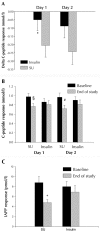Effects of insulin versus sulphonylurea on beta-cell secretion in recently diagnosed type 2 diabetes patients: a 6-year follow-up study
- PMID: 21409314
- PMCID: PMC3061612
- DOI: 10.1900/RDS.2010.7.225
Effects of insulin versus sulphonylurea on beta-cell secretion in recently diagnosed type 2 diabetes patients: a 6-year follow-up study
Abstract
Background: Early insulin treatment is considered more beneficial than anti-diabetic medication with sulphonylureas, because the latter may exert negative effects on beta-cell function, while the former may help preserve it. In a previous study, we found that C-peptide response was increased in the insulin-treated group, whereas it was decreased in the glibenclamide group. However, it was not certain whether the advantage remained in the longer term.
Aim: In this study, we tested whether early insulin treatment is more beneficial than glibenclamide against a 6-year follow-up perspective.
Methods: We designed a randomized clinical trial in subjects with newly diagnosed type 2 diabetes. Glucagon stimulatory tests, measuring C-peptide and islet amyloid polypeptide (IAPP), were performed after 2, and 3, days of temporary insulin and glibenclamide withdrawal.
Results: 18 subjects initially randomized to glibenclamide, and 16 randomized to two daily injections of insulin, participated in end-of-study investigations. C-peptide response to glucagon deteriorated (p < 0.01 vs. baseline) in initially glibenclamide-treated patients (n = 18), but not in insulin-treated patients (p < 0.05 for difference between groups, after 2 days of treatment withdrawal). The IAPP response to glucagon declined in the glibenclamide group (p < 0.001), but not in insulin-treated subjects (p = 0.05 for difference between groups).
Conclusions: Early insulin treatment preserves beta-cell secretory function better than glibenclamide even in a 6-year perspective.
Figures


Similar articles
-
Beneficial effects of insulin versus sulphonylurea on insulin secretion and metabolic control in recently diagnosed type 2 diabetic patients.Diabetes Care. 2003 Aug;26(8):2231-7. doi: 10.2337/diacare.26.8.2231. Diabetes Care. 2003. PMID: 12882841 Clinical Trial.
-
Effects of insulin vs. glibenclamide in recently diagnosed patients with type 2 diabetes: a 4-year follow-up.Diabetes Obes Metab. 2008 May;10(5):421-9. doi: 10.1111/j.1463-1326.2007.00719.x. Epub 2007 Mar 29. Diabetes Obes Metab. 2008. PMID: 17394534 Clinical Trial.
-
Characteristics of pancreatic beta-cell secretion in Type 2 diabetic patients treated with gliclazide and glibenclamide.Diabetes Res Clin Pract. 2001 May;52(2):103-11. doi: 10.1016/s0168-8227(00)00242-4. Diabetes Res Clin Pract. 2001. PMID: 11311964 Clinical Trial.
-
Repaglinide : a pharmacoeconomic review of its use in type 2 diabetes mellitus.Pharmacoeconomics. 2004;22(6):389-411. doi: 10.2165/00019053-200422060-00005. Pharmacoeconomics. 2004. PMID: 15099124 Review.
-
Assessment of residual insulin secretion in diabetic patients using the intravenous glucagon stimulatory test: methodological aspects and clinical applications.Diabetes Metab. 1996 Dec;22(6):397-406. Diabetes Metab. 1996. PMID: 8985647 Review.
Cited by
-
Reduction of Sulfonylurea with the Initiation of Basal Insulin in Patients with Inadequately Controlled Type 2 Diabetes Mellitus Undergoing Long-Term Sulfonylurea-Based Treatment.Diabetes Metab J. 2016 Dec;40(6):454-462. doi: 10.4093/dmj.2016.40.6.454. Epub 2016 Oct 11. Diabetes Metab J. 2016. PMID: 27766795 Free PMC article.
-
The effects of early short-term insulin treatment vs. glimepiride on beta cell function in newly diagnosed type 2 diabetes with HbA1c above 9.Turk J Med Sci. 2023 Apr;53(2):552-562. doi: 10.55730/1300-0144.5616. Epub 2023 Apr 19. Turk J Med Sci. 2023. PMID: 37476884 Free PMC article. Clinical Trial.
-
The Infamous, Famous Sulfonylureas and Cardiovascular Safety: Much Ado About Nothing?Curr Diab Rep. 2017 Oct 23;17(12):124. doi: 10.1007/s11892-017-0954-4. Curr Diab Rep. 2017. PMID: 29063276 Review.
-
The Association between Sulfonylurea Use and All-Cause and Cardiovascular Mortality: A Meta-Analysis with Trial Sequential Analysis of Randomized Clinical Trials.PLoS Med. 2016 Apr 12;13(4):e1001992. doi: 10.1371/journal.pmed.1001992. eCollection 2016 Apr. PLoS Med. 2016. PMID: 27071029 Free PMC article. Review.
-
Medication time of metformin and sulfonylureas and incidence of cardiovascular diseases and mortality in type 2 diabetes: a pooled cohort analysis.Sci Rep. 2025 Mar 11;15(1):8401. doi: 10.1038/s41598-025-89721-7. Sci Rep. 2025. PMID: 40069233 Free PMC article.
References
-
- Grill V, Björklund A. Overstimulation and beta-cell function. Diabetes. 2001;50(Suppl 1):S122–S124. - PubMed
-
- Buchanan TA. Pancreatic beta-cell loss and preservation in type 2 diabetes. Clin Ther. 2003;25(Suppl B):B32–B46. - PubMed
-
- Fridlyand LE, Philipson LH. Does the glucose-dependent insulin secretion mechanism itself cause oxidative stress in pancreatic beta-cells? Diabetes. 2004;53:1942–1948. - PubMed
-
- Donath MY, Schumann DM, Faulenbach M, Ellingsgard H, Perren A, Ehses JA. Islet inflammation in type 2 diabetes: from metabolic stress to therapy. Diabetes Care. 2008;31(Suppl 2):S161–S164. - PubMed
Publication types
MeSH terms
Substances
LinkOut - more resources
Full Text Sources
Medical
